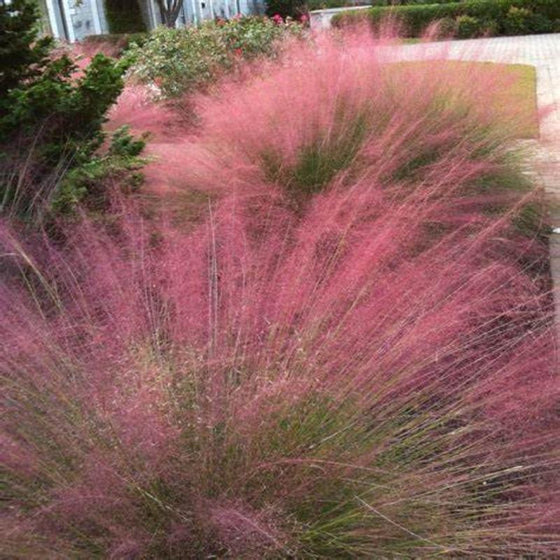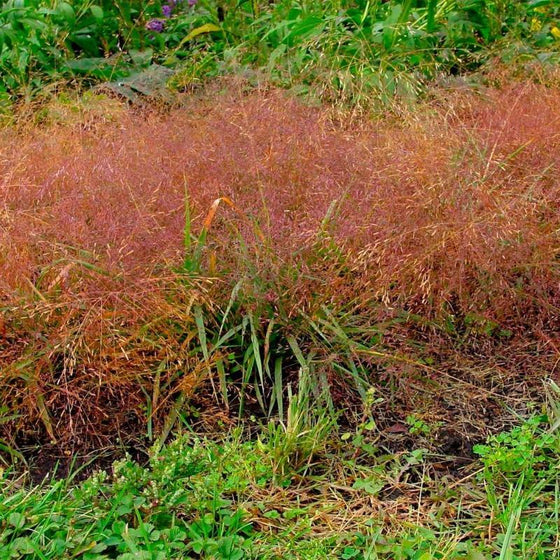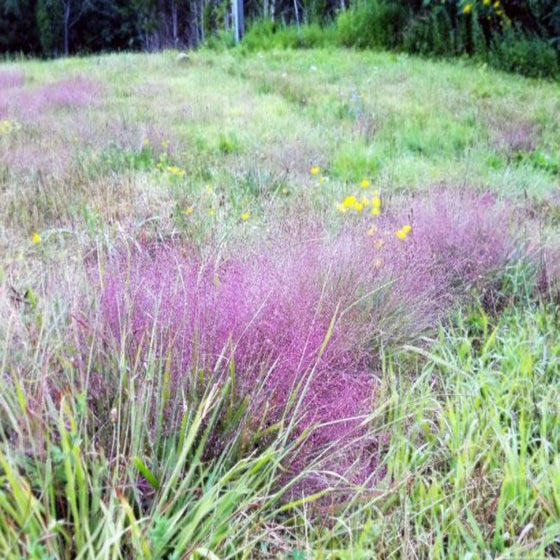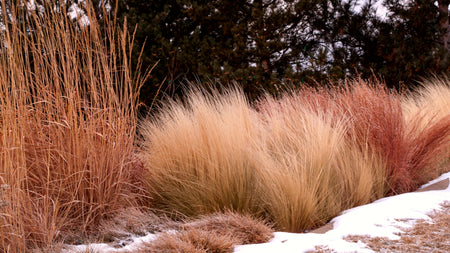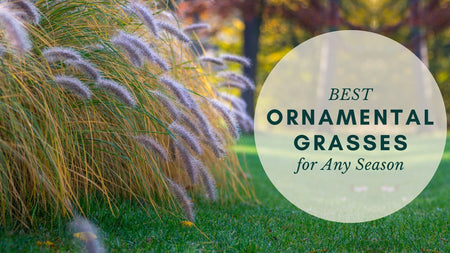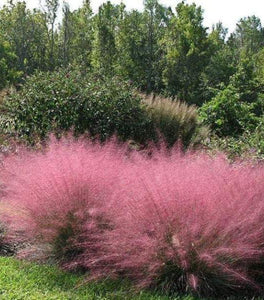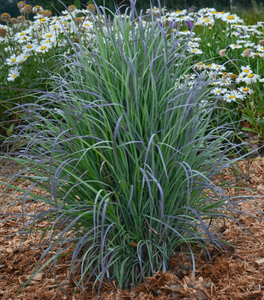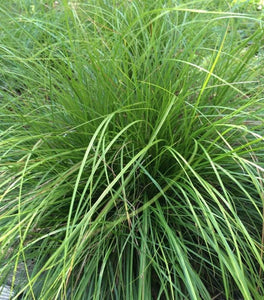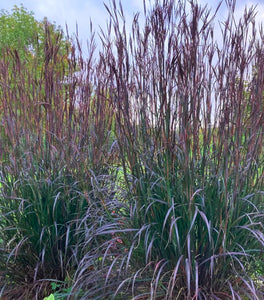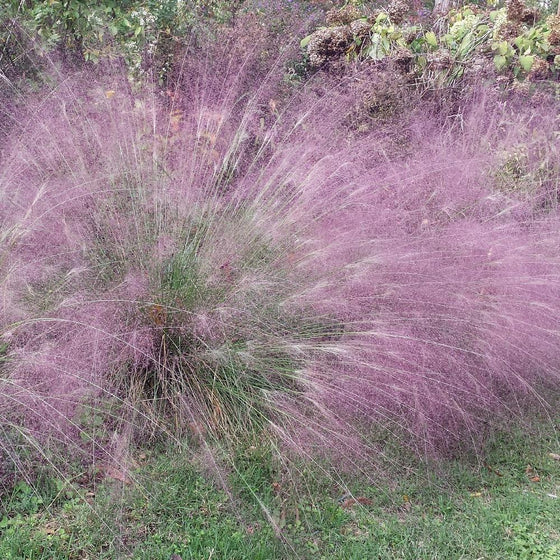
Images Depict Mature Plants
Purple Love Grass for Sale Online
Purple Love Grass (Eragrostis spectabilis) is a striking ornamental grass known for its airy, cloud-like plumes of purple-pink flowers that appear in late summer and early fall. Growing to a height of 1-2 feet and spreading about 1-2 feet wide, this low-growing grass adds movement and texture to landscapes, creating a soft, wispy effect as its colorful blooms sway in the breeze. Purple Love Grass is perfect for adding a pop of color to borders, rock gardens, and mass plantings, where its vivid flower heads provide seasonal interest and contrast to more structured plants. The delicate seed heads eventually turn into a reddish-brown hue, offering even more visual appeal as the season progresses.
Hardy in USDA Zones 5-9, Purple Love Grass thrives in full sun and well-drained soils, making it an ideal choice for xeriscaping, dry slopes, or areas with poor soil. This drought-tolerant grass requires minimal maintenance once established and can withstand hot, dry conditions. Its versatility allows it to perform well in both formal and naturalized settings, where it can be used to create a stunning ground cover or to fill in gaps between perennials. Purple Love Grass is also deer-resistant, making it a reliable choice for gardens in wildlife-prone areas.
In addition to its ornamental value, Purple Love Grass provides environmental benefits by helping with soil stabilization and erosion control, particularly on slopes or embankments. Its deep root system helps prevent soil erosion, making it an excellent option for areas that experience runoff or need stabilization. Whether used as a standalone feature or as part of a mixed planting, Purple Love Grass adds color, movement, and resilience to your garden while requiring very little care to thrive.
Purple Love grass is widely used by internationally renowned garden designer Piet Oudolf and was listed as one of the "100 Must-Have Plants" in Gardens Illustrated magazine. The species was extensively planted in Oudolf's designs for New YorK City's Highline and Chicago's Lurie Garden.
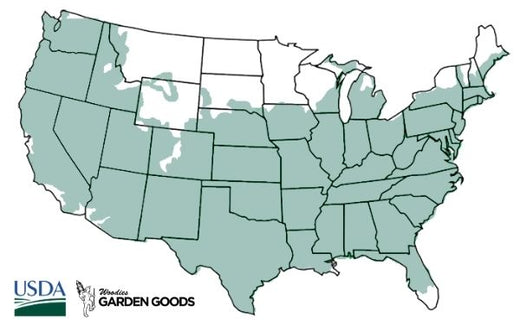
| Hardiness Zone: | 5-9 |
|---|---|
| Mature Height: | 1 to 2 Feet |
| Mature Width: | 1 to 2 Feet |
| Sunlight: | Full sun to part shade |
| Water Requirements: | Drought tolerant after established |
| Selling Points: | Deer Resistant, Native |
How to Care for Purple Love Grass
Before you buy a Purple Love Grass, make sure to read about the care instructions that are required and recommended to keep this plant healthy and thriving.
How do I Plant Purple Love Grass?
To plant Purple Love Grass (Eragrostis spectabilis), choose a location with full sun and well-drained soil, as this drought-tolerant ornamental grass thrives in dry, sunny conditions. Begin by loosening the soil and amending it with compost if necessary, especially in compacted or heavy clay soils, to improve drainage. Dig a hole slightly larger than the root ball and place the plant at the same depth it was growing in its container. Space each plant about 12-18 inches apart if planting multiple Purple Love Grass to allow for their mature size and spreading habit. After planting, water thoroughly to help the grass establish, but avoid overwatering, as this grass prefers dry to moderately moist conditions. Purple Love Grass is perfect for xeriscaping, borders, rock gardens, and areas prone to erosion, as its deep root system helps stabilize soil and prevent runoff. Once planted, mulch around the base to retain moisture while ensuring the crown remains exposed to prevent rot. Purple Love Grass requires minimal maintenance and thrives in poor soils, making it an ideal choice for low-maintenance landscapes. With proper planting and care, this grass will quickly establish and produce its stunning purple-pink plumes in late summer, adding vibrant color and texture to your garden.
How do I Water Purple Love Grass?
When watering Purple Love Grass it's important to remember that this drought-tolerant plant thrives in dry to moderately moist soil. After planting, water thoroughly to help establish a strong root system, but ensure the soil has good drainage to avoid waterlogged conditions. During the first growing season, water regularly to help the grass settle into its new environment, but be sure to let the soil dry out between waterings. Once established, Purple Love Grass requires very little supplemental water, as it naturally thrives in dry, well-drained soils and can tolerate periods of drought. After the first year, Purple Love Grass needs minimal watering, making it an ideal choice for xeriscaping and low-maintenance landscapes. In fact, too much water can lead to poor growth and rotting roots, so it's best to water sparingly, especially during periods of regular rainfall. For container-grown Purple Love Grass, allow the soil to dry out between waterings and ensure the pot has proper drainage. By following a low-water routine, Purple Love Grass will continue to flourish, providing beautiful purple-pink plumes and vibrant texture to your garden without the need for constant care.
How Do I Fertilize Purple Love Grass?
When fertilizing Purple Love Grass (Eragrostis spectabilis), it's important to remember that this drought-tolerant ornamental grass thrives in poor, well-drained soils and generally requires minimal fertilization. In early spring, you can apply a light, balanced slow-release fertilizer, such as a 10-10-10 formula, to give the grass a gentle nutrient boost as it begins its growing season. Sprinkle the fertilizer around the base of the plant, avoiding direct contact with the foliage, and water thoroughly to help the nutrients absorb into the soil. However, avoid over-fertilizing, as too much nitrogen can lead to excessive foliage growth at the expense of the grass’s vibrant purple plumes. Once established, Purple Love Grass typically doesn't require frequent fertilization, as it is adapted to thrive in nutrient-poor conditions. If you’re growing it in particularly poor or sandy soil, a single light application of fertilizer in the spring should suffice. Alternatively, you can add a thin layer of compost to the soil to provide a natural nutrient boost. Over-fertilizing can weaken the plant’s drought tolerance and reduce its compact, clumping form, so it’s best to keep the feeding light. With minimal fertilization, Purple Love Grass will maintain its stunning late-summer blooms and continue to thrive in low-maintenance landscapes.

How do I prune my Purple Love Grass?
To prune Purple Love Grass the best time is in late winter or early spring before new growth begins. Use sharp pruning shears to cut back the old, dried flower stalks and foliage to about 2-3 inches above the ground. This encourages fresh growth and keeps the plant looking neat and healthy for the upcoming growing season. Pruning Purple Love Grass helps remove dead material from the previous season and stimulates vibrant new foliage and blooms. The grass will quickly regrow and begin producing its signature purple-pink plumes by late summer. Throughout the growing season, Purple Love Grass requires little to no pruning. However, if the plant becomes too large or untidy, you can trim back any overgrown or unruly sections to maintain its shape. Be sure to avoid heavy pruning during the growing season, as this can stress the plant and reduce flowering. In late fall, you may choose to leave the dried flower plumes in place for winter interest or trim them back for a cleaner look. Regular pruning in early spring will ensure that Purple Love Grass stays healthy and vibrant, contributing texture and color to your landscape throughout the year.

